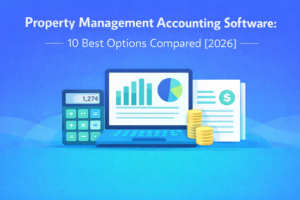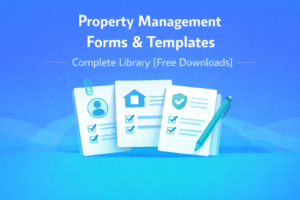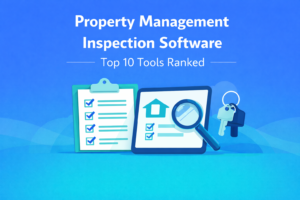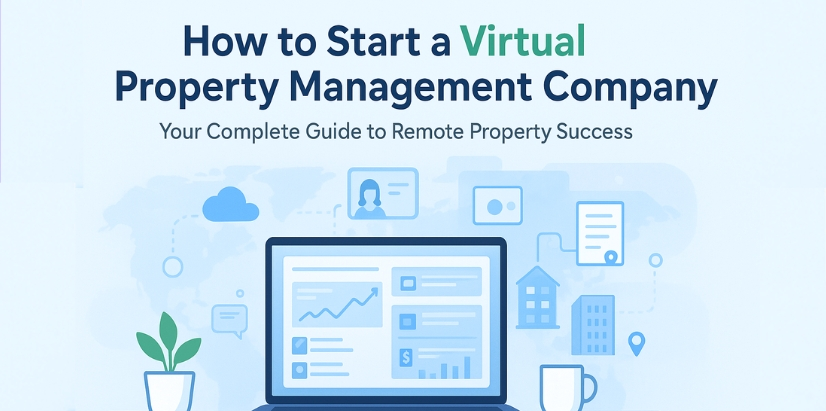
The world of property management is changing at a lightning-fast pace, and the shift toward remote and digital-first business operations has created new opportunities for prospective business owners. Starting a virtual property management business is becoming a reality, and those who adapt early to this technology will gain a substantial competitive edge.
What Is Virtual Property Management?
Virtual property management oversees rental properties, tenants, and daily operations remotely with the assistance of digital means. Rather than face-to-face meetings, office paperwork, or manual records, a virtual property manager utilizes cloud-based software, artificial intelligence-powered systems, and communication platforms to manage it all efficiently. This method saves money, enhances scalability, and enables property managers to cater to clients in various regions without geographical limitations.
For instance, by using cloud-based real estate software, property managers are able to manage tasks such as collecting rent, maintenance requests, accounting, and tenant communication remotely from any corner of the world. Let’s see why cloud-based virtual property management software is increasingly becoming useful and necessary for property managers.
Why Go Virtual?
Running a virtual property management company is the new norm. Here are a few reasons why it makes sense to go virtual:
- Less overhead expense: No space to rent and no big staff to hire.
- Flexibility: Work from anywhere and serve clients from multiple locations.
- Automation: Leverage AI and software to minimize repetitive tasks.
- Scalability: Grow quickly without geographic boundaries to restrict you.
Modern property owners also prefer working with managers who are tech-savvy and responsive. Read how AI is shaping property management software to understand how digital tools enhance efficiency.
Steps to Start a Virtual Property Management Company
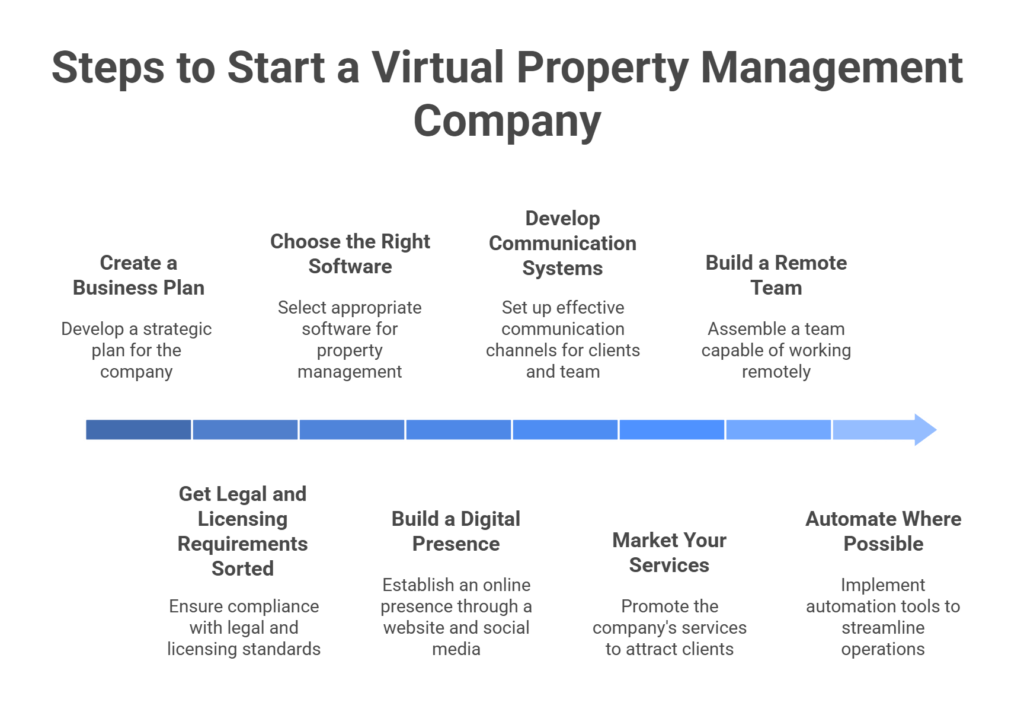
Starting a business involves careful planning. Let’s step through the most important steps:
1. Create a Business Plan
Determine your purpose, target market, and services to be offered. Will you target residential, commercial, or holiday rentals? Clear goals guide how you will market and run your business. For insights on structuring your business effectively, check out this guide to property management business models.
2. Get Legal and Licensing Requirements Sorted
Research the local laws. Property management licenses are required in some states, and real estate brokerage licenses in others. This blog on property management requirements by state can help clarify the essentials.
3. Choose the Right Software
Invest in a dependable property management software that has accounting, communication, and task automation capabilities. Solutions such as Propertese provide functionality to facilitate virtual operations. Read more on how advanced software solutions improve property management.
4. Build a Digital Presence
Build a professional website, optimize it for SEO, and run digital ads to target new clients. Social media marketing and email marketing are also crucial for lead generation. Explore how digital marketing for property managers highlights ways to turn prospects into paying clients.
5. Develop Communication Systems
Effective and efficient communication is critical for virtual property management. Leverage online portals, chat platforms, and email automation to maintain relationships with tenants and owners. Explore smart solutions for tenant communication.
6. Market Your Services
Advertise your company using social media, real estate communities online, and networking events. Paid advertisements, email marketing, and local search engine optimization are necessary to stand out among the digital crowd. Here are some innovative marketing ideas for property managers.
7. Build a Remote Team
Outsource or hire freelancers for bookkeeping, leasing, or customer service work. Virtual assistants can also help offload much of your work.
8. Automate Where Possible
Automate the collection of rent, schedule maintenance, and accounting to save time and improve accuracy. Find out the advantages of automation in property management.
Essential Tools for Running a Virtual Property Management Business
Operating a business online demands robust tools and equipment. Some of the essential ones are:
- Property management software: Porpertese to track leases, collect rents, and facilitate maintenance requests.
- Communication software: Zoom, Slack, or Teams for communication with clients and tenants.
- Digital marketing software: Google Ads, social media planners, and CRM systems.
- Accounting tools: To manage expenses, income, and reporting efficiently.
Using the right combination of tools can transform efficiency. This blog explains how Propertese enhances property management efficiency.
Common Challenges of Virtual Property Management
The advantages are numerous, but challenges are also present with virtual property management:
- Technology dependence: Without reliable software and the internet, operations can come to a standstill.
- Tenant trust: There might be tenants who only feel comfortable with in-person interactions.
- Regulatory compliance: Laws and regulations vary from state to state.
- Management of teams: Managing remote workers requires an organized system.
But with proper planning and reliable platforms, these issues can be minimized.
Future of Virtual Property Management
AI, automation, and cloud technology are dictating the future of the real estate industry. With time, landlords will demand digital-first services, and virtual property management companies will become mainstream. According to the industry trends, the real estate industry’s future will be all about:
- AI-powered tenant screening.
- Automated rent collections.
- Property marketing campaigns with VR/AR.
- Cloud-based management systems.
You can read more about future real estate technologies in our comprehensive and insightful blog.
Final Thoughts
To start and run a virtual property management business, you need a combination of technology, legal knowledge, and customer service. If you have the right tools at hand, you can keep overhead minimum, grow quicker, and offer excellent services that resonate with current property owners and tenants.
If you’re ready to take the leap, begin with a solid business plan, invest in property management software, and focus on digital communication strategies. With Propertese, you can start building a future-driven and successful virtual property management company.
Table of Contents
Stay Updated
Subscribe to get the latest news, industry trends, blog posts, and updates...

